100 GREATEST AFRICANS OF ALL TIME: Fela Anikulapo-Kuti
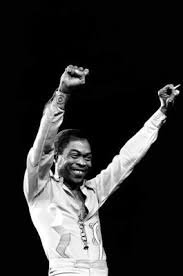
**ImageSource: creative commons
Fela Anikulapo-Kuti is perhaps the greatest globally famous Nigerian musician who was not only a musician but a revolutionary human rights activist, pan-africanist, mystic, legend and a man of multiple talents when it comes to musical instrument like percussion and wind instruments.
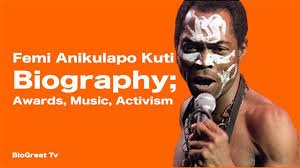
On the 15th of October 1938, a legend was born in Abeokuta, south western Nigeria to be christened Olufela Olusegun Oludotun Ransome-Kuti. He attended the Abeokuta Grammar School in Abeokuta and later he was sent to London in 1958 to study medicine but decided to study music instead at the Trinity College of Music, the trumpet being his preferred instrument.
He started Afrobeat, a music genre which he formed from an ingenius blend of jazz and highlife and African traditional music. The evolution of Afrobeat from Koola Lobitos, a band he formed when he was a student in the United Kingdom would become one of the pride of African music up till date. In 1963, Fela moved back to Nigeria, re-formed Koola Lobitos and trained as a radio producer for the Nigerian Broadcasting Corporation. He played for some time with Victor Olaiya and his All Stars.
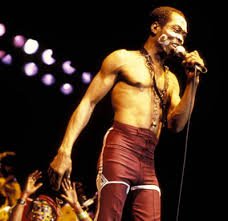
In 1967, he went to Ghana to think up a new musical direction. That was when Kuti first called his music Afrobeat. In 1969, Fela took the band to the United States where they spent 10 months in Los Angeles. While there, Fela discovered the Black Power movement through Sandra Smith (now Sandra Izsadore), a partisan of the Black Panther Party. The experience would heavily influence his music and political views. He renamed the band Nigeria ‘70. Soon afterwards, the Immigration and Naturalization Service was tipped off by a promoter that Fela and his band were in the US without work permits. The band immediately performed a quick recording session in Los Angeles that would later be released as The ‘69 Los Angeles Sessions.
After Fela and his band returned to Nigeria, the group was renamed The Afrika ‘70, as lyrical themes changed from love to social issues. He then formed the Kalakuta Republic, a commune, a recording studio, and a home for the many people connected to the band that he later declared independent from the Nigerian state. (According to Lindsay Barrett, the name “Kalakuta” derived from the infamous Black Hole of Calcutta dungeon in India.) Fela set up a nightclub in the Empire Hotel, first named the Afro-Spot and then the Afrika Shrine, where he both performed regularly and officiated at personalized Yoruba traditional ceremonies in honour of his nation’s ancestral faith. He also changed his middle name to Anikulapo (meaning “He who carries death in his pouch”, with the interpretation: “I will be the master of my own destiny and will decide when it is time for death to take me”), stating that his original middle name of Ransome was a slave name. Fela’s music was popular among the Nigerian public and Africans in general. In fact, he made the decision to sing in Pidgin English so that his music could be enjoyed by individuals all over Africa, where the local languages spoken are very diverse and numerous.
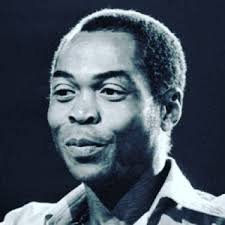
As popular as Fela’s music had become in Nigeria and elsewhere, it was also very unpopular with the ruling government, and raids on the Kalakuta Republic were frequent. During 1972, Ginger Baker recorded Stratavarious with Fela appearing alongside Bobby Tench. Around this time, Kuti became even more involved in the Yoruba religion. In 1977, Fela and the Afrika ‘70 released the album Zombie, a scathing attack on Nigerian soldiers using the zombie metaphor to describe the methods of the Nigerian military. The album was a smash hit and infuriated the government, setting off a vicious attack against the Kalakuta Republic, during which one thousand soldiers attacked the commune. Fela was severely beaten, and his elderly mother (whose house was located opposite the commune) was thrown from a window, causing fatal injuries. The Kalakuta Republic was burned, and Fela’s studio, instruments, and master tapes were destroyed. Fela claimed that he would have been killed had it not been for the intervention of a commanding officer as he was being beaten. Fela’s response to the attack was to deliver his mother’s coffin to the Dodan Barracks in Lagos, General Olusegun Obasanjo’s residence, and to write two songs, “Coffin for Head of State” and “Unknown Soldier”, referencing the official inquiry that claimed the commune had been destroyed by an unknown soldier.
In 1978, Fela married 27 women, many of whom were his dancers, composers, and singers to mark the anniversary of the attack on the Kalakuta Republic, although Fela married his first wife, Remilekun (Remi) Taylor, with whom he would have three children (Femi, Yeni, and Sola) In 1960. Later, he was to adopt a rotation system of keeping only 12 simultaneous wives.
He formed his own political party, which he called Movement of the People (MOP), in order to “clean up society like a mop”. In 1979, he put himself forward for President in Nigeria’s first elections for more than a decade, but his candidature was refused. At this time, Fela created a new band called Egypt ‘80 (reflecting his reading of pan-African literature) and continued to record albums and tour the country. He further infuriated the political establishment by dropping the names of ITT Corporation vice-president Moshood Abiola and then General Olusegun Obasanjo at the end of a hot-selling 25-minute political screed entitled “I.T.T. (International Thief-Thief)”.
In 1984, Muhammadu Buhari’s government, of which Kuti was a vocal opponent, jailed him on a charge of currency smuggling which Amnesty International and others denounced as politically motivated. Amnesty designated him a prisoner of conscience, and his case was also taken up by other human rights groups. After 20 months, he was released from prison by General Ibrahim Babangida. On his release he divorced his 12 remaining wives, saying that “marriage brings jealousy and selfishness”. Once again, Fela continued to release albums with Egypt ‘80, made a number of successful tours of the United States and Europe and also continued to be politically active. In 1986, Fela performed in Giants Stadium in New Jersey as part of the Amnesty International A Conspiracy of Hope concert, sharing the bill with Bono, Carlos Santana, and The Neville Brothers. In 1989, Fela and Egypt ‘80 released the anti-apartheid Beasts of No Nation that depicts on its cover U.S. President Ronald Reagan, UK Prime Minister Margaret Thatcher and South African State President Pieter Willem Botha, that title of the composition, as Barrett notes, having evolved out of a statement by Botha: “This uprising against the apartheid system will bring out the beast in us.”
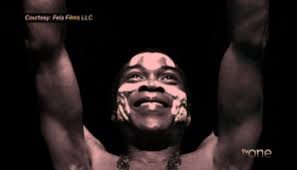
Fela’s album output slowed in the 1990s, and eventually he stopped releasing albums altogether. In 1993, he and four members of the Afrika ‘70 organization were arrested for murder. The battle against military corruption in Nigeria was taking its toll, especially during the rise of dictator Sani Abacha. Rumours were also spreading that he was suffering from an illness for which he was refusing treatment. Death On 3 August 1997, Olikoye Ransome-Kuti, already a prominent AIDS activist and former Minister of Health, stunned the nation by announcing his younger brother’s death a day earlier from Kaposi’s sarcoma which was brought on by AIDS.
Reference:
http://www.vanguardngr.com/2015/10/profile-of-fela-anikulapo-kuti/